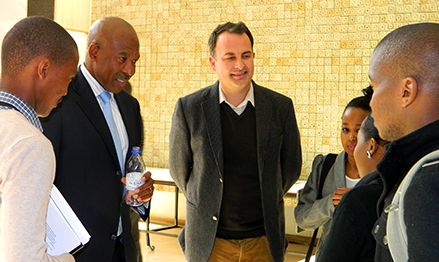Latest News Archive
Please select Category, Year, and then Month to display items
17 June 2020
|
Story Dr WP Wahl

The Division of Student Affairs (DSA) prioritises innovation to meet the challenges of food insecurity and malnutrition among students. To this end, several student volunteers and student governance structures are collaborating with the DSA on various initiatives.
During 2019, various conversations were held about the possibility of creating a health-promoting food environment at the UFS where students and staff are well informed and empowered to take appropriate action regarding their food and nutritional needs. These conversations resulted in an institutional strategy to address the food environment at the UFS. Student representatives serve on a technical committee that directs the implementation of this strategy. In this regard, several initiatives have already been launched.
Students from residences and other student communities have planted vegetable gardens on the Bloemfontein Campus with the assistance of KovsieACT and the Faculty of Natural and Agricultural Sciences. Students and staff are already harvesting and distributing vegetables to needy students every week. Measurements were put in place to continue this during the COVID-19 period. The following vegetables were planted: spinach, cabbage, beetroot, broccoli, cauliflower, and carrots.
Food parcels, donated by Tiger Brands and Gift of the Givers, are continuously handed out by DSA staff and student volunteers. In this regard, 540 food parcels have already been handed out on the Bloemfontein Campus during the COVID-19 period alone. During the same time, 117 students received food parcels on the Qwaqwa Campus. The innovation of this food parcel project rests on the fact that business, NPOs, UFS students, and DSA staff are collaborating to address food insecurity and malnutrition.
More collaborative initiatives will be implemented over the next 12 months. The DSA staff and students are already working with the Department of Dietetics and Consumer Sciences to create information packages about the preparation of low-budget nutritious meals.
Related article:
Vegetable tunnels established to continue the fight against food insecurity
UFS101 students learn from the masters
2013-09-01
 |
Letsetja Kganyago (second from the left) and Dr Francois Strydom (on the right, next to him, Director of the Centre for Teaching and Learning, in discussion with third-year students.
Photo: Stefan Lotter
01 September 2013 |
Huge effort is employed to expose first-year students through the UFS101 programme to the largest possible landscapes of South African politicals, economics and other fields. The lecture that Letsetja Kganyago, Deputy Governor of the South African Reserve Bank, delivered in August 2013, was no exception.
About 4 000 students attended the lecture at the Bloemfontein Campus, of which 150 students on the Qwaqwa Campus shared in the proceedings via live streaming. Kganyago discussed the impact of the international financial crisis on South Africa, as well as on the man in the street.
Third-year and postgraduate students also had an opportunity to talk to him during his visit.
The UFS101 programme was bolstered earlier this year through lectures delivered by a judge from the Free State Supreme Court, as well as Prof Jonathan Jansen, Vice-Chancellor and Rector.